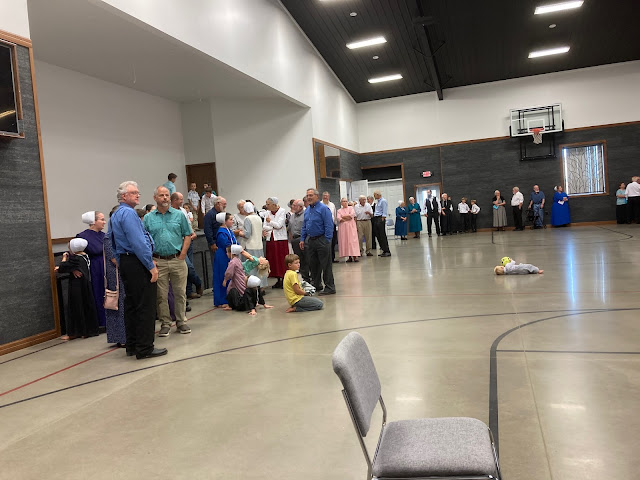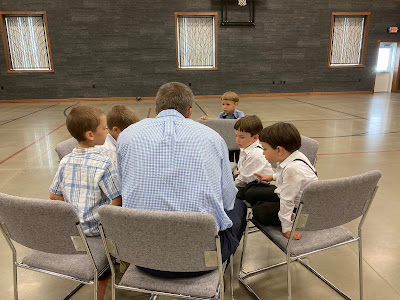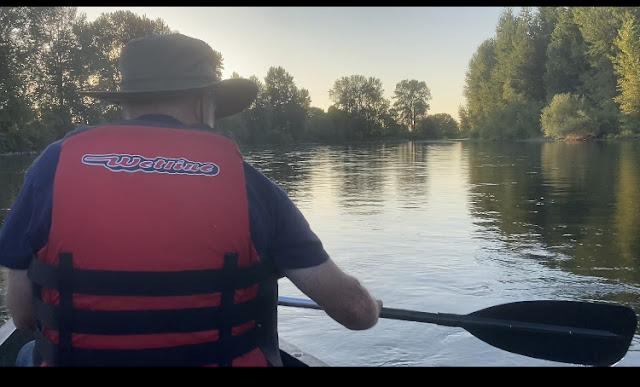When Uncle Johnny calls me, he hollers into the phone, wondering how I’m doing, how Paul is recovering from his accident, and, sometimes, when I’m coming to see him. “You’ll come see me when I’m in a box,” he grumbled one time, and I thought that was probably true. Wouldn’t it be nice, though, if I found a way to see him before that?
I holler my answers when Johnny asks me questions, and on a
good day he hears about 10% of what I’m saying. But we still manage to feel
connected and up to date, and that’s what matters.
Johnny is my dad’s youngest brother. Dad lived to be almost
103, Johnny just turned 100, and their mother was almost 104 when she passed.
“Sucks to be you,” a young friend told me when I quoted these numbers. But I am
ok with the longevity genes I carry, because “Kansas Mommi” and Dad and Johnny
made it look like long years of enjoying life, pursuing interests you didn’t
have time for when you were fifty, and (Mommi especially) getting by with
speaking your mind because people give you a free pass when you’re old. Dad was
reading a classic—I think it was War and Peace—shortly before he died, and he
wrote countless letters in his final years. Mommi was also a prolific
letter-writer, with a mind tack-sharp almost to the end. Johnny had been living
alone since his wife, Bertha, passed away maybe six years ago, and he hosted a
revolving roster of visiting relatives in his basement. “Johnny’s EconoLodge,”
he called it. In the last year, his son and daughter-in-law moved into the
basement to stay with him. Up to age 99,
Johnny also had a job spraying his neighbors’ fencerows.
When the family announced a 100th birthday party
for Uncle Johnny, I remembered his comment about seeing him in a box and
decided to prioritize seeing him alive and well.
So Paul and I, as well as most of my siblings and their
spouses, headed for Kansas two weeks ago. We stayed in some friends’ beautiful
house and filled our days with a book event, an afternoon tea with a fun bunch
of ladies, a visit to a museum, church on Sunday, visiting an Amish family
whose daughter lives with our daughter in Thailand, cooking dinners for all of
us, and of course the party itself, all in the context of Kansas in August.
At the tea party, I met my friend Miriam’s daughter-in-law,
a lovely young lady who told me she grew up in Washington State, in the
mountains, no less. She indicated that the transition to Kansas hasn’t been
easy.
I tried to imagine it. Living in the Northwest, you expect
the horizon to be like a frame around your world, and you get used to driving
an hour or so and seeing a completely different landscape. All the physical
features—from forests to desert to ocean beaches to high mountains—are wild and
huge and breathtaking.
The graph-paper-grid roads, the landscape, and the
farmhouses reminded me of Minnesota where I grew up, only Kansas is more so.
Roads don’t detour around lakes, and the land is even flatter than central
Minnesota. The roads are wide and the fields are wider.
I heard someone use the word “boring.”
“Here, we watch the sky for drama, rather than the
landscape,” one of the women said.
That made sense to me. Compared to Oregon’s sedate weather,
the Midwest’s tornadoes and hail and thunderstorms are wild drama. If I lived
in Kansas, I’m sure I would watch them like all the locals and download a
weather-radar app on my phone.
Still, I think I’d find it difficult to look at those flat fields,
stretching to the flat horizon, day after day.
However, there’s something I could endlessly watch for sheer
entertainment if I lived in Hutchinson, Kansas, and that is the people. Not only does the
community offer Uncle Johnny and all his quirks, along with dozens of
interesting relatives, it is also home to a unique stripe of Anabaptists who
value reading and studying more than any other group of Plain people I’ve had
the chance to observe. I decided to make the most of this trait and organized a
book signing plus had a boxful of books in the car during Johnny’s party.
Happily, that was the right move, and my favorite customer was the Amish woman,
probably fifteen years older than me, who bought a stack of books at the event
at Rendezvous Coffee and then nimbly climbed into her blue tractor and drove
away.
Hundreds of people showed up for Johnny’s party, and the
line waiting to greet Johnny stretched around all four sides of the gym. I
talked with many different people, finding the most random points of
connection. Evelyn and I were penpals when we were teenagers. Emma Grace was
the little sister of my playmate Priscilla in Iowa when I was four or five, and now she’s
married to my cousin Herman. My cousin Freeman and his wife Margaret came from
Oklahoma, and we reminisced about the tea party she hosted at her house and how
her son came in with a snake he’d found, which she realized was not a wise move
to make if I was her guest. Roy from Montana is my local friend Jane’s brother
and he’s married to my cousin Glenn’s daughter. And on and on, with not nearly
enough time to connect and observe like I wanted, especially with a bunch of little Amish children kicking a soccer ball or waiting patiently in line. But what I squeezed in was
precious and nourishing, deep down.
The Amish generally aren’t big on hugging, but Johnny is an
exception. He hugged all of us and let us know how glad he was that we had come.
I’m told he learned to hug after his children were pretty much grown up, and
his daughter decided The Time Had Come and taught her parents this valuable
skill.
Johnny has also learned to use a cell phone. My cousin John
Earl’s wife Janice told me that the week before the party, Johnny had asked her
to take him to town. They arranged a time, and Janice arrived to pick him up.
Johnny didn’t come to the door, and she couldn’t find him in the house. She
looked all around the basement, fearing she’d find him collapsed or worse, but
no Johnny.
Finally, she called his cell phone. Johnny answered,
hollering, “I’m not interested! I’m almost one hundred years old, and I’m outta
the game!”
That’s his standard answer for telemarketers.
So Janice knew he was alive, but she still didn’t know where
he was.
Finally he came walking in from a row of trees some distance
from the house, where he’d been cleaning up in preparation for company coming.
He had forgotten about Janice coming to take him to town.
I hope when I’m 100 years old I can still look outside and
see mountains on the horizon, because despite being raised in the Midwest, I
like having a frame around the world. Even more, I hope that I’ll keep in touch
with my descendants and nieces and nephews, find useful things to do and good
books to read, and welcome hundreds of people to my party. I hope I drop useless
traditions and pick up new ones that serve me far better. I hope I find life
endlessly interesting, whether I live in Kansas or Oregon or the uttermost
parts of the world.
Maybe the key to an interesting life is not so much where you live,
but how, and among whom.
 |
| Here's part of the line waiting to wish Johnny a happy birthday. |
 |
| Roy read to the little kids |
 |
| Paul and my cousin Truman caught up with their lives. |
 |
| Chad the brother-in-law's cousin John took us on a tour of the Inman museum. He is really good at what he does, and I absorbed more Mennonite history in two hours than in the past ten years. |
 |
| Anna and Marcus, Loraine and Fred, Rebecca, me and Paul, and Margaret and Chad [the sibs are Marcus, Fred, Rebecca, me, and Margaret. Our oldest brother, Phil, wasn't there.] |





